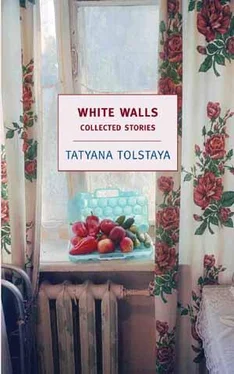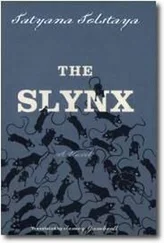“Well, what are you staring at?” shouted the fairy. “Get out of here, you retard!”
Mamochka came in with a bubbling pot. He looked in. There were the pink weenies of sausages. He was glad. Mamochka sets the table, moves, wipes up. The knife pops out of his fingers, strikes the oilcloth somewhere to the side.
“In your hands, take the sausage in your hands.”
Ah, Mamochka, guiding star! Heart of gold! You’ll fix everything. Wise, you’ll unravel all the tangles, you’ll destroy all the back alleys, all the labyrinths of this incomprehensible, unnavi-gable world with your powerful hand, you’ll sweep away all the walls—here’s an even, leveled plaza. Boldly take one more step. Farther on—wind-fallen trees.
Alexei Petrovich has his own world—in his head, the real one. Everything’s allowed there. But this one, outside—is bad, wrong. And it’s very hard to remember what’s good and what’s bad. They’ve set up and agreed upon written Rules that are awfully complicated. They’ve learned them, their memory is good. But it’s hard for him to live by someone else’s Rules.
Mamochka poured coffee. Coffee has a Smell. You drink it—and the smell goes over to you. Why aren’t you allowed to make your lips into a tube, cross your eyes to look at your mouth, and smell yourself? Let Mamochka turn her back.
“Alexei, behave yourself!”
After breakfast they cleaned the table, set out the glue, cardboard, scissors, tied a napkin around Alexei Petrovich: he’s going to glue boxes. When he’s done a hundred of them—they’ll take them to the pharmacy. They’ll get some money. Alexei Petrovich loves these boxes, he doesn’t like to part with them. He wants to hide them on the sly, save at least some for himself, but Mamochka watches carefully and takes them away.
And then other people carry them out of the pharmacy, eat little white balls from them, and they tear up the boxes and throw them away. They throw them right in the trash bin, even worse, in their apartments, in the kitchen, in the trash he saw a ripped-up, dirtied box with a cigarette butt inside. A fearful black rage then filled Alexei Petrovich, his eyes flashed, he foamed at the mouth, forgot words, fiery spots flashed in front of his eyes, he could have strangled, torn them to pieces. Who did this? Who dared do this? Come on out, why don’t you! He rolled up his sleeves: Where is he? Mamochka ran over, calmed him down, led the enraged Alexei Petrovich off, took away the knife, tore the hammer from his convulsed fingers. The Men and Women were afraid and sat quietly, hidden in their rooms.
The sun has moved to another window. Alexei Petrovich has finished his work. Mamochka fell asleep in the chair, she’s snoring, her cheeks gurgle, she whistles: pssshhew-ew-ew… Alexei Petrovich oh so quietly takes two boxes, ca-arefully, on tip-tip-tippy-toes—goes to his bed, ca-aarefully, carefully puts them under his pillow. At night he’ll take them out and sniff them. How the glue smells! Soft, sour, muffled, like the letter F.
Mamochka woke up, it’s time to take a walk. Down the stairs, only not in the elevator—you can’t close Alexei Petrovich up in the elevator: he’ll begin to flail and squeal like a rabbit; why don’t you understand?—they’re pulling, pulling on my legs, dragging them down.
Mamochka floats ahead, nods at acquaintances. Today we’ll deliver the boxes: unpleasant. Alexei Petrovich deliberately drags his feet: he doesn’t want to go to the pharmacy.
“Alexei, don’t stick out your tongue!”
The dawn has fallen behind the tall buildings. The gold windowpanes burn right under the roof. Special people live there, not the same kind as us: they fly like white doves, flitting from balcony to balcony. A smooth, feathery breast, human face—if a bird like that roosts on your railings, tilts its head and starts to coo and bill—you’ll look into its eyes, forget human speech, and start clucking in bird language, you’ll jump along the iron poles with fuzzy little legs.
Under the horizon, under the bowl of the earth, giant wheels have started turning, monstrous conveyer belts are winding, toothed gears are pulling the sun down and the moon up. The day is tired, it has folded its white wings, flies westward, big, in loose clothes, it waves a sleeve, releases stars, blesses the people walking on the chilling earth: good-bye, good-bye, I’ll come again tomorrow.
They’re selling ice cream on the corner. He’d really like some ice cream. Men and Women—but especially Women—stick money into the square window and get a frosty, crunchy goblet. They laugh; they throw the round, sticky papers on the ground or stick them on the wall, they open their mouths wide, lick the sweet, needlelike cold with red tongues.
“Mamochka, ice cream!”
“You’re not allowed. You have a sore throat.”
If he mustn’t, he mustn’t. But he really, really wants some. It’s awful how much he wants some. If he had one of those monies, like other Men and Women have, one of the silvery, shiny ones; or a little yellow piece of paper that smells like bread—they also take those at the square windows. Ooh, ooh, ooh, how he wants ice cream, they’re all allowed, they all get ice cream.
“Alexei, don’t twist your head around!”
Mamochka knows best. I’m going to listen to Mamochka. Only she knows the safe path through the thickets of the world. But if Mamochka turned away… Pushkin Square.
“Mamochka, Pushkin—is he a writer?”
“A writer.”
“I’m going to be a writer too.”
“Of course you will. If you want to—you will.”
And why not? He wants to, so he will be. He’ll get some paper, a pencil, and he’ll be a writer. There, that’s decided. He’ll be a writer. That’s fine.
In the evenings Mamochka sits in a spacious armchair, pushes her glasses down on her nose, and reads thickly:
“A pall the storm casts on the sky,
And whirls the twisting snow,
First like a beast she’ll howl and cry,
Then like a child sob soft and low.”
Alexei Petrovich really loves this. He laughs heartily, baring his yellow teeth; happy, he stamps his foot.
“First like a beast she’ll howl and cry,
Then like a child sob soft and low.”
The words get to the end—and turn around, get to the end again—and turn around again.
“Apall thus tormcas tson thus ky,
An dwhirls thet wistings no!
First likab eastsheel howland cry,
Then likach ild sobs off tandlow!”
Very good. This is how she’ll howl: oo-oooooo!
Shhh, sshhh, Alexei, calm down!
The sky is all sprinkled with stars. Alexei Petrovich knows them: little shining beads, hanging all by themselves in the black emptiness. When Alexei Petrovich lies in bed and wants to go to sleep, his legs start growing on their own, down, down, and his head grows up, up, to the black dome, up, and sways like the top of a tree in a storm, while the stars scrape his skull like sand. And the second Alexei Petrovich, inside, keeps shrinking and shrinking, compressing, he disappears in a poppy seed, in a sharp needle tip, in a microbe, in nothingness, and if he’s not stopped, he’ll vanish there completely. But the outside, giant Alexei Petrovich sways like a pine log mast, grows, scratches his bald spot against the night dome, doesn’t allow the little one to disappear into a dot. And these two Alexei Petroviches are one and the same. And this makes sense, this is right.
At home Mamochka undresses, demolishes her daytime corpus, puts on a red robe, becomes simpler, warmer, more comprehensible. Alexei Petrovich wants Mamochka to pick him up. What nonsense! Mamochka goes out into the kitchen. It seems like she’s been gone an awful long time. Alexei Petrovich checked whether the boxes were still there, sniffed the oilcloth, took a chance, and went out into the hall. The corner door, where the guests of the Sea Girl giggle at night, was cracked open. A white bed was visible. Where’s Mamochka? Maybe she’s in there? Alexei Petrovich peeped in the crack cautiously. No one. Maybe Mamochka hid in the closet? Should he go in? The room is empty. On the Sea Girl’s table—an open tin can, bread, a nibbled pickle. And—a little piece of yellow paper and silver circles. Money! Take the money, run downstairs along the dark staircase, into the labyrinth of streets, look for the square window, and they’ll give him a sweet cold cup.
Читать дальше












